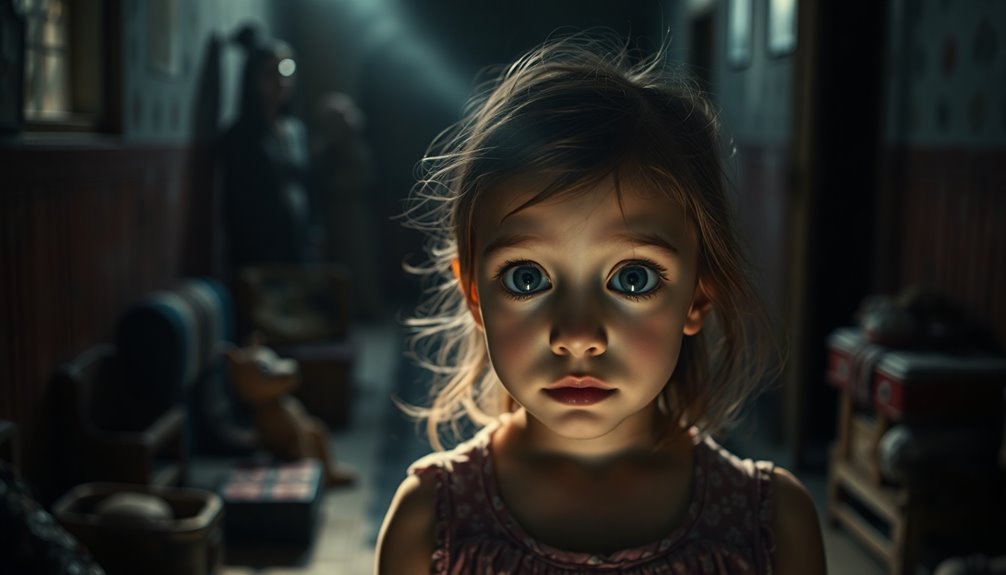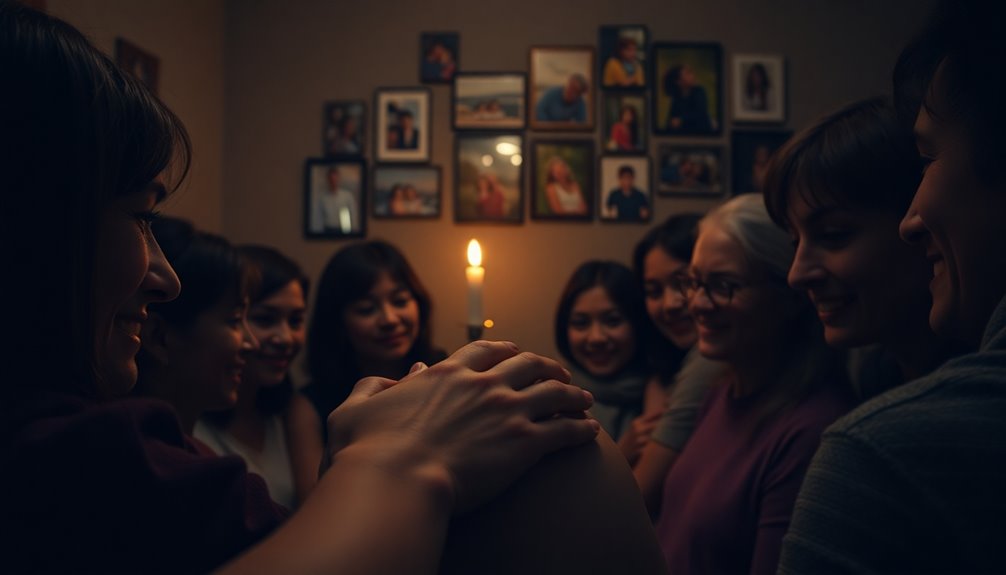Gypsy Rose Blanchard's biography unfolds a shocking narrative filled with manipulation and deceit. Her mother, Dee Blanchard, controlled her life through Munchausen Syndrome by Proxy, fabricating illnesses to gain sympathy. This twisted dynamic left Gypsy in a medical cage, suffering from unnecessary procedures and isolating experiences. When Gypsy sought freedom, it led to her mother's tragic murder in 2015, sparking public outrage and confusion over her role. This complicated story raises important questions about victimhood and manipulation. There's much more to uncover about Gypsy's journey from control to reclaiming her life and identity.
Key Takeaways
- Gypsy Rose Blanchard was raised by her mother Dee, who inflicted Munchausen Syndrome by Proxy, fabricating illnesses for attention.
- She underwent numerous unnecessary medical procedures, including full dentures at age 16, denying her a normal childhood.
- Gypsy felt trapped in her mother's control, leading to her involvement in Dee's murder as a desperate escape.
- The case illustrates the complexities of victimhood, as Gypsy's actions challenge perceptions of innocence and guilt in abusive relationships.
- Her story serves as a cautionary tale about the profound effects of manipulation and the importance of recognizing abuse.
Introduction

Gypsy Rose Blanchard's story is one of profound deception and resilience. You'll find it hard to believe how her life unfolded under the control of her mother, Dee Blanchard, who fabricated a series of severe medical conditions. For a long time, Gypsy lived in a world where she was thought to suffer from leukemia, paralysis, and more, all while being celebrated by the community as an inspirational figure. Initially, they received overwhelming support, including a new home from Habitat for Humanity after Hurricane Katrina.
However, beneath this façade lurked a dark reality. Dee manipulated and abused Gypsy, locking her in a shed as punishment for the simplest desires, like connecting with others online. It wasn't until Gypsy met Nicholas Godejohn that she found a glimmer of hope. Their relationship sparked a desperate need for freedom, ultimately leading to drastic measures. Gypsy's journey reveals not just the complexity of her relationship with her mother, but also the psychological trauma she endured. This tale of survival sends a powerful message about the lengths one might go to escape a life of control and deception.
Childhood in a Medical Cage

Growing up under the watchful eye of her mother, Dee Blanchard, was like living in a meticulously crafted cage. Dee did a great job of fabricating numerous severe medical conditions for you, including leukemia and paralysis. You were often over-medicated, resulting in the need for full dentures by age 16, despite having no actual medical issues. The world outside felt distant as you navigated a life filled with doctor visits and hospital stays, all while trying to understand the reality of your situation.
Confined and punished, you sometimes found yourself locked in a shed, intensifying your feelings of entrapment. The community, unaware of the truth, viewed you and Dee as inspirational survivors of Hurricane Katrina, further masking the underlying abuse. You yearned for freedom, and your first romantic encounter at a Cinderella movie premiere with Nicholas ignited a spark of hope. This connection complicated your life even more, but it also fueled your desire to break free from the constraints imposed by Dee. In this suffocating environment, you struggled to find your identity, all while trying to escape the medical cage that defined your childhood.
Munchausen Syndrome by Proxy

The experience of living under Dee Blanchard's control was a chilling example of Munchausen Syndrome by Proxy (MSBP), a psychological condition where a caregiver intentionally fabricates or exaggerates a child's illnesses for attention. In Gypsy Rose's case, her mother's actions led to a nightmare of unnecessary medical procedures and over-medication, causing Gypsy's health to deteriorate significantly.
You can see how this dynamic created an environment where Gypsy felt trapped and abused. Her mother's need for validation fueled this cycle of deceit, making it difficult for anyone to recognize the true nature of her suffering. Gypsy's innocence kept her in the dark about the severity of her situation, ultimately driving her to conspire in her mother's murder.
In the first place, the psychological scars inflicted by this abuse make recovery challenging. After Dee passed away, Gypsy faced the daunting task of reintegrating into society while grappling with the trauma left by her mother's manipulation. Escaping MSBP is only the beginning of a long journey toward healing, as victims like Gypsy must confront the pain and confusion of their past.
Frequently Asked Inquiries

Understanding Gypsy Rose Blanchard's story raises many questions for those unfamiliar with the complexities of her situation. You might wonder how someone could be manipulated to such an extent. Even though Gypsy appeared to be a victim, her life was filled with deception crafted by her mother, Dee Blanchard. Many people initially viewed them as survivors of hardship, only to later realize the extent of the abuse and manipulation.
You may ask why Gypsy didn't try to escape sooner. The psychological grip her mother held over her was powerful, and Gypsy was effectively trying to break free from a lifetime of control. Her mother's fabrications led to years of unnecessary medical treatments and a distorted reality.
After the shocking murder of Dee, questions about mental health and the dynamics of abusive relationships emerged. Gypsy's case illustrates how victimhood can be complicated, challenging our perceptions of innocence and guilt. As you delve deeper into her story, you'll likely find yourself grappling with these nuanced issues, seeking to understand how one can be both a victim and an active participant in such tragic circumstances.
Support Groups for Survivors

For survivors like Gypsy Rose, support groups offer a vital lifeline, allowing you to connect with others who've faced similar struggles. These groups create a safe space where you can share your story and find understanding among those who truly get it. Many support groups focus on the psychological impact of manipulation and control, helping you reclaim your autonomy and work through the trauma.
Participating in peer-led discussions and workshops can empower you to develop self-advocacy skills, ultimately improving your mental health and well-being. Organizations like the National Domestic Violence Hotline provide specialized support for those who've experienced coercive control, emphasizing the importance of recognizing and addressing the signs of abusive relationships.
Additionally, online support groups have gained popularity, offering anonymity and accessibility for survivors to seek help without fear of judgment. This digital format allows you to share experiences and coping strategies with others, no matter where you are. By engaging with these support groups, you can foster a sense of community that reminds you that you're not alone in your journey toward healing and recovery.
Conclusion

Reflecting on Gypsy Rose Blanchard's harrowing journey reveals the chilling realities of abuse and manipulation that can exist behind closed doors. Her life, marred by her mother Dee's deceitful actions, exemplifies how victimhood can manifest in deeply damaging ways. Gypsy was trapped in a web of lies, with her mother fabricating illnesses to garner sympathy and financial support, all while controlling Gypsy's life and choices.
The tragic murder of Dee in 2015 exposed the extent of this manipulation, shocking the world when it was revealed that Gypsy had no real health issues. Her story doesn't just stop at the crime; it continues through a highly publicized trial that brought to light the complexities of abuse and the psychological scars that linger long after the abuse ends. Gypsy's actions, influenced by years of trauma, also raise ethical questions about her relationship with Nicholas, who faced his own struggles.
Ultimately, Gypsy Rose Blanchard's narrative serves as a cautionary tale, highlighting the dangers of Munchausen syndrome by proxy and the profound consequences of manipulation on vulnerable individuals. It's a stark reminder that victims can emerge from the shadows, seeking their own truth and freedom.
Frequently Asked Questions
What Legal Actions Did Gypsy Rose Take Against Her Mother?
You might find that Gypsy Rose took significant legal actions against her mother, including pleading guilty to murder. She sought to escape years of manipulation and abuse, ultimately leading to her mother's tragic demise.
How Has Gypsy Rose's Life Changed Since Her Release?
Since her release, you'll notice Gypsy Rose has embraced freedom, pursuing education and forming new relationships. She's focused on healing, advocating for others, and finding her identity away from her past struggles and traumas.
What Role Did Social Services Play in Gypsy's Situation?
Social services played a crucial role in your situation, failing to recognize the signs of abuse and neglect. Their oversight allowed a toxic environment to persist, impacting your life and well-being significantly.
Are There Any Documentaries About Gypsy Rose's Story?
Yes, there are several documentaries about Gypsy Rose's story. You can explore titles like "Mommy Dead and Dearest," which delve into her life, the complexities of her situation, and the shocking events that unfolded.
How Does Gypsy Rose Feel About Her Past Today?
You might find that Gypsy Rose feels a mix of regret and a desire for freedom about her past. She's working on healing while embracing her newfound independence, hoping to build a brighter future.










